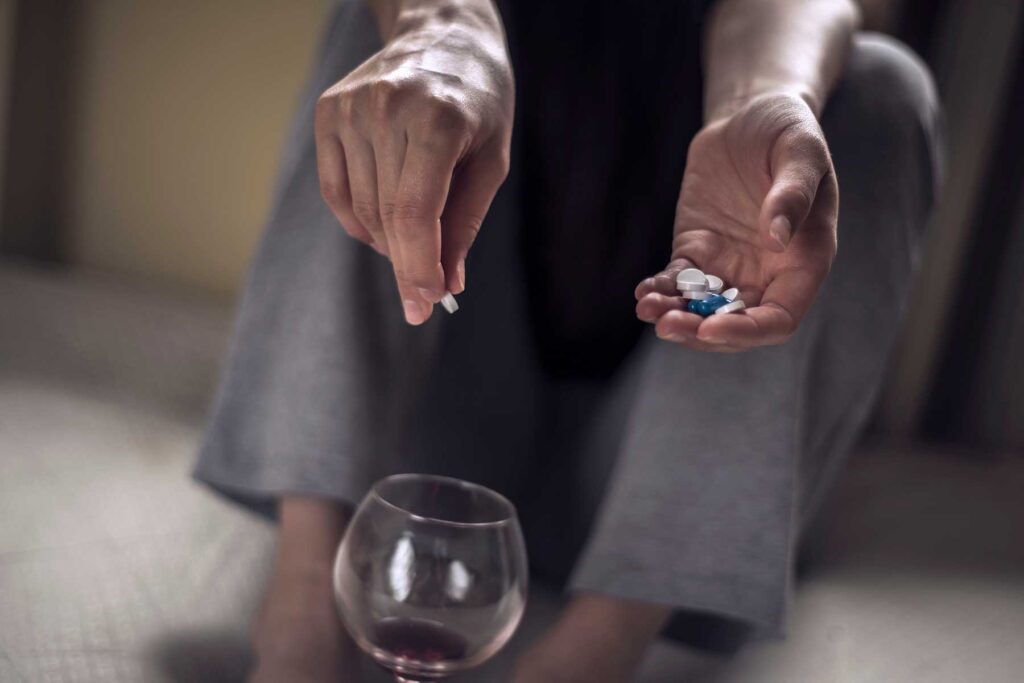Mixing benzodiazepines with alcohol can be a deadly combination. Benzodiazepines, also known as “benzos,” are some of the most commonly prescribed drugs in America. They’re used to treat anxiety, insomnia, and other psychological ailments. When taken as prescribed, they are generally very safe. However, when taken with alcohol, benzos can cause serious and potentially fatal consequences. It is important to seek help as soon as possible for individuals struggling with benzo and alcohol abuse.
If you or a loved one requires substance abuse treatment in Tennessee, Promises Behavioral Health can help. Call 844.875.5609 today to learn about our programs and services, including our alcohol rehab center and benzo addiction treatment program.
What Are Benzos?
Benzodiazepines, commonly known as “benzos,” are a class of medications that work on the central nervous system to produce calming and sedative effects. They are typically prescribed for anxiety and insomnia due to their ability to reduce stress and help induce sleep. Benzos may also be used to treat seizures, muscle spasms, alcohol withdrawal, and panic attacks.
The most commonly prescribed benzo medications include:
- Xanax
- Ativan
- Klonopin
- Valium
- Restoril
Although benzos can provide short-term relief from symptoms of anxiety or insomnia, they come with some potential risks, such as physical dependence and tolerance. Long-term use of benzos should only be done under the careful supervision of a doctor. It is important to take benzos exactly as instructed by your doctor to avoid any side effects or complications associated with misuse or overuse. Additionally, individuals should never mix benzos with alcohol or other drugs without first consulting a doctor. Taking the wrong combination of medications, or taking these medications with other substances, like alcohol, could result in life-threatening consequences.
Why Mixing Benzos and Alcohol Is Dangerous
Mixing benzodiazepines, such as Xanax and Valium, with alcohol, can be dangerous. The combination of the two substances creates a powerful effect and can lead to serious side effects that may require medical attention.
This is because alcohol is a depressant that increases the effects of other central nervous system depressants, such as benzos. This can lead to an increased risk of overdose and death. Benzos are also used in combination with alcohol to increase the intoxication effect; however, this further compounds the danger due to their combined sedative properties.
Additionally, taking both substances together can increase the amount of time it takes for them to be metabolized by the body, resulting in prolonged impairment and potential negative reactions. Taking both alcohol and benzos together can have serious implications on physical health, including difficulty breathing or loss of consciousness that could be life-threatening.
The following symptoms are associated with mixing benzos and alcohol:
- Drowsiness or difficulty staying awake
- Slowed breathing rate
- Poor coordination or balance
- Nausea and vomiting
- Confusion or disorientation
- Memory impairment or amnesia
- Impaired judgment in decision making
- Uncontrolled shaking of the body (tremors)
- Loss of consciousness, coma, or death in extreme cases
It is important to stay informed and know the risks of taking alcohol or benzos in combination. If you or someone you know is engaging in this behavior, reaching out for help is crucial.
How Professional Treatment Can Help Benzo and Alcohol Abuse
Professional treatment for benzo and alcohol abuse can be vital in helping a person stop their addiction. There are a variety of treatment options available, including both inpatient and outpatient care. Inpatient programs focus on providing medical and psychological help to ensure the individual is as comfortable as possible during their recovery process. Outpatient programs provide support for those who have already completed an inpatient program or may not need 24-hour care.
In addition to traditional therapies such as cognitive-behavioral therapy (CBT) and other psychotherapies, professionals may also recommend medications to assist with managing cravings, reducing anxiety, improving sleep quality, relieving withdrawal symptoms, or preventing relapse. Medications can be prescribed by a doctor or nurse practitioner either alone or in combination with therapy.
It is also important for people in recovery to look for alternative treatments such as yoga, meditation, acupuncture, massage therapy, art therapy, and journaling. These activities help to reduce stress and tension while promoting relaxation and mindfulness. Additionally, support groups provide a safe place where individuals can share their experiences with others struggling with similar issues.
Professional treatment can be an effective way to stop benzo and alcohol abuse and achieve lasting sobriety. With the right treatment plan and support system in place, anyone can make progress toward a healthier lifestyle. If you or someone you know is suffering from benzodiazepine or alcohol addiction, it is important to seek professional help as soon as possible.
Get Help for Substance Abuse at Promises Behavioral Health
Substance use disorder is a serious health condition that can have long-term consequences if left untreated. Fortunately, Promises Behavioral Health offers evidence-based treatment for individuals struggling with substance use disorder. We understand that the path to recovery is unique for each individual, so we customize our treatment plans to meet the individual needs of each client. Call 844.875.5609 today or fill out our online contact form to learn how we can help.

